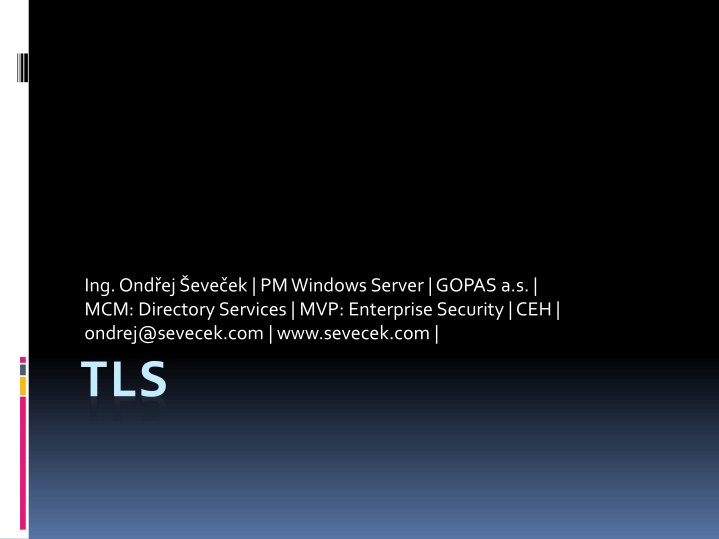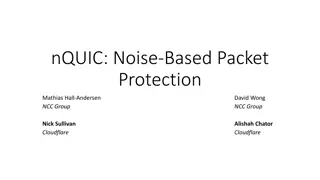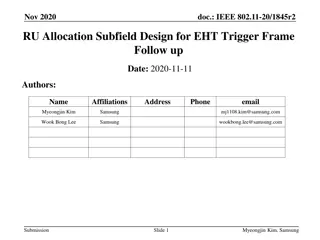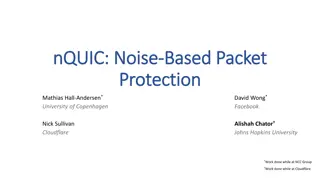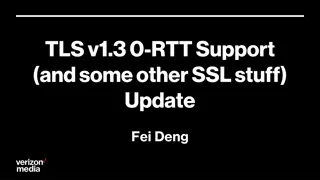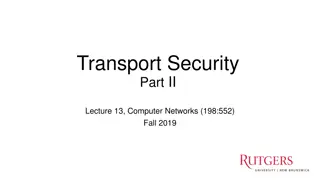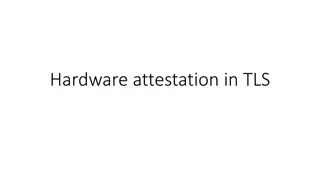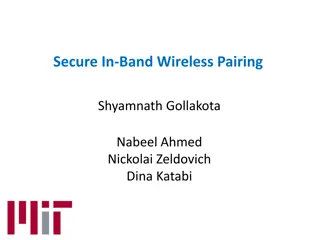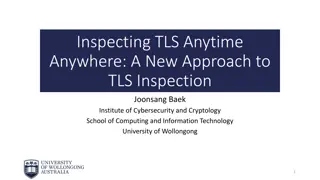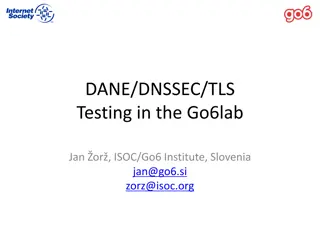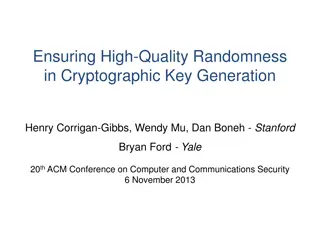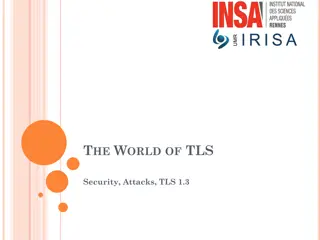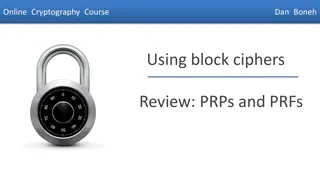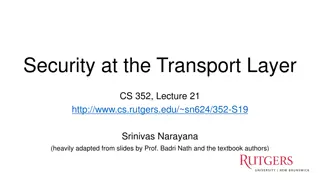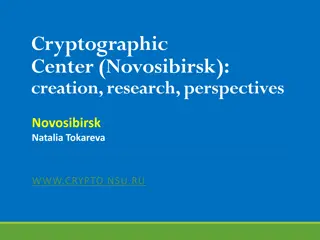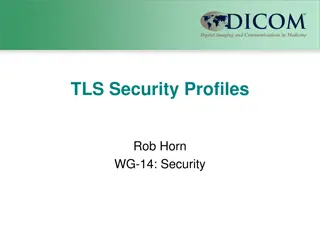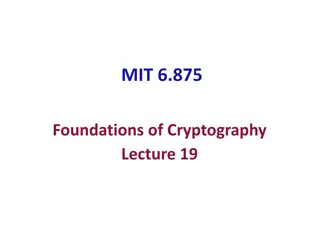TLS Protocol Basics: Standard Cryptographic Protocol for Secure Transmissions
Transport Layer Security (TLS) is a standard cryptographic protocol used for secure transmissions over networks. It provides encryption and server identity authentication, ensuring data privacy and integrity. TLS supports various algorithms like RSA, DSA, EC, and encryption methods like RC4, DES, AES. It is commonly used in protocols like HTTPS, LDAPS, SQL, SMTPS, and more. Learn about TLS versions, SSL vs. TLS differences, and server/client certificate authentication in this comprehensive overview.
Download Presentation

Please find below an Image/Link to download the presentation.
The content on the website is provided AS IS for your information and personal use only. It may not be sold, licensed, or shared on other websites without obtaining consent from the author.If you encounter any issues during the download, it is possible that the publisher has removed the file from their server.
You are allowed to download the files provided on this website for personal or commercial use, subject to the condition that they are used lawfully. All files are the property of their respective owners.
The content on the website is provided AS IS for your information and personal use only. It may not be sold, licensed, or shared on other websites without obtaining consent from the author.
E N D
Presentation Transcript
Ing. Ondej eveek |PM Windows Server |GOPAS a.s.| MCM: Directory Services | MVP: Enterprise Security | CEH | ondrej@sevecek.com | www.sevecek.com | TLS
Agenda What is TLS Algorithms and certificates Operating system support Attacks and patches Client certificate authentication
TLS PROTOCOL BASICS
Transport Layer Security Standard cryptographic protocol for secure transmissions RSA/DSA/EC, RC4, DES, AES, MD5, SHA1, Encryption and server identity authentication HTTPS, SSTP, IPHTTPS, LDAPS, SQL, RDPS, SMTPS, Hyper-V replication, 802.1x EAP Client certificate authentication Requires public key certificate on the server
SSL vs. TLS SSL 2.0 (1995) -Windows 2000+ MITM can downgrade cipher suite to 40-bit MAC hashes can be downgraded to 40-bit SSL 3.0 (1996) -Windows 2000+ Support for DH, Fortezza key exchanges Support for non RSA certificates TLS 1.0 (1999) -Windows 2000+ Security same as SSL 3.0 Protocol not compatible with SSL 3.0 IETF and US FIPS standard TLS 1.1 and 1.2 (2006, 2008) -Windows 7/2008 R2 More recent standards offering SHA2 suites Can fallback to TLS 1.0 without TCP RST
TLS with server certificate only Server Certificate TLS tunnel Server Client Application traffic HTTP, LDAP, SMTP, RDP
TLS with client certificate Server Certificate Client Certificate TLS tunnel Server Client Application traffic HTTP, LDAP, SMTP, RDP
Server certificate Encryption key "transport" RSA key exchange DSA/DH key agreement ECDSA/ECDH key agreement Server identity authentication Subject and SAN names time validity trusted issuer chain revocation checking with CRL/OCSP
SChannel COM library for establishing TLS communications SCHANNELSecurity Provider HKLM\System\CCS\Control\SecurityProviders\SC HANNEL Group Policy Policies / Administrative Templates / Network / SSL
SSL 2.0 cipher suites SSL_RC4_128_WITH_MD5 SSL_DES_192_EDE3_CBC_WITH_MD5 SSL_RC2_CBC_128_CBC_WITH_MD5 SSL_DES_64_CBC_WITH_MD5 SSL_RC4_128_EXPORT40_WITH_MD5
Disable SSL 2.0 HKLM\System\CurrentControlSet\Control\Se curityProviders \SCHANNEL\Protocols \PCT 1.0 \SSL 2.0 \Client Enabled = DWORD = 0 \Server Enabled = DWORD = 0
Enable TLS 1.1 and 1.2 HKLM\System\CurrentControlSet\Control\Se curityProviders \SCHANNEL\Protocols \TLS 1.1 \TLS 1.2 \Client Enabled = DWORD = 1 DisabledByDefault = DWORD = 0 \Server Enabled = DWORD = 1 DisabledByDefault = DWORD = 0
Windows XP/2003- TLS/SSL cipher suites (no AES) TLS_RSA_WITH_RC4_128_MD5 TLS_RSA_WITH_RC4_128_SHA TLS_RSA_WITH_3DES_EDE_CBC_SHA TLS_DHE_DSS_WITH_3DES_EDE_CBC_SHA TLS_RSA_WITH_DES_CBC_SHA TLS_DHE_DSS_WITH_DES_CBC_SHA TLS_RSA_EXPORT1024_WITH_RC4_56_SHA TLS_RSA_EXPORT1024_WITH_DES_CBC_SHA TLS_DHE_DSS_EXPORT1024_WITH_DES_CBC_SHA TLS_RSA_EXPORT_WITH_RC4_40_MD5 TLS_RSA_EXPORT_WITH_RC2_CBC_40_MD5 TLS_RSA_WITH_NULL_MD5 TLS_RSA_WITH_NULL_SHA SSL_RSA_WITH_RC4_128_SHA SSL_RSA_WITH_3DES_EDE_CBC_SHA SSL_DHE_DSS_WITH_3DES_EDE_CBC_SHA SSL_RSA_WITH_RC4_128_MD5
AES support on Windows 2003 KB948963 TLS_RSA_WITH_AES_128_CBC_SHA AES128-SHA TLS_RSA_WITH_AES_256_CBC_SHA AES256-SHA
Disable/Enable Suites KB245030 HKLM\SYSTEM\CCS\Control\SecurityProvide rs\SCHANNEL\Ciphers\NULL Enabled = DWORD = 0 RC4 40/128, RC2 56/56, RC2 56/128, RC4 56/128, RC4 64/128, RC2 128/128, Triple DES 168/168, RC4 128/128,
Windows Vista/2008+ TLS v1.0 cipher suites (AES/EC/SHA1) TLS_RSA_WITH_AES_128_CBC_SHA TLS_RSA_WITH_AES_256_CBC_SHA TLS_RSA_WITH_RC4_128_SHA TLS_RSA_WITH_3DES_EDE_CBC_SHA TLS_ECDHE_RSA_WITH_AES_128_CBC_SHA TLS_ECDHE_RSA_WITH_AES_256_CBC_SHA TLS_ECDHE_ECDSA_WITH_AES_128_CBC_SHA TLS_ECDHE_ECDSA_WITH_AES_256_CBC_SHA TLS_DHE_DSS_WITH_AES_128_CBC_SHA TLS_DHE_DSS_WITH_AES_256_CBC_SHA TLS_DHE_DSS_WITH_3DES_EDE_CBC_SHA TLS_RSA_WITH_RC4_128_MD5
Windows 7/2008 R2 TLS v1.1 cipher suites (AES/EC/SHA2) TLS_RSA_WITH_AES_128_CBC_SHA256 TLS_RSA_WITH_AES_128_CBC_SHA TLS_RSA_WITH_AES_256_CBC_SHA256 TLS_RSA_WITH_AES_256_CBC_SHA TLS_RSA_WITH_RC4_128_SHA TLS_RSA_WITH_3DES_EDE_CBC_SHA TLS_ECDHE_RSA_WITH_AES_128_CBC_SHA256_P256 TLS_ECDHE_RSA_WITH_AES_128_CBC_SHA256_P384 TLS_ECDHE_RSA_WITH_AES_128_CBC_SHA_P256 TLS_ECDHE_RSA_WITH_AES_128_CBC_SHA_P384 TLS_ECDHE_RSA_WITH_AES_256_CBC_SHA_P256 TLS_ECDHE_RSA_WITH_AES_256_CBC_SHA_P384 TLS_ECDHE_ECDSA_WITH_AES_128_GCM_SHA256_P256 TLS_ECDHE_ECDSA_WITH_AES_128_CBC_SHA256_P256 TLS_ECDHE_ECDSA_WITH_AES_128_GCM_SHA384_P384 TLS_ECDHE_ECDSA_WITH_AES_128_CBC_SHA384_P384 TLS_ECDHE_ECDSA_WITH_AES_128_CBC_SHA_P256 TLS_ECDHE_ECDSA_WITH_AES_128_CBC_SHA_P384 TLS_ECDHE_ECDSA_WITH_AES_256_CBC_SHA_P256 TLS_ECDHE_ECDSA_WITH_AES_256_CBC_SHA_P384 TLS_DHE_DSS_WITH_AES_128_CBC_SHA256 TLS_DHE_DSS_WITH_AES_128_CBC_SHA TLS_DHE_DSS_WITH_AES_256_CBC_SHA256 TLS_DHE_DSS_WITH_AES_256_CBC_SHA TLS_DHE_DSS_WITH_3DES_EDE_CBC_SHA TLS_RSA_WITH_RC4_128_MD5 SSL_CK_RC4_128_WITH_MD5 SSL_CK_DES_192_EDE3_CBC_WITH_MD5 TLS_RSA_WITH_NULL_SHA256 TLS_RSA_WITH_NULL_SHA SSL_RSA_WITH_RC4_128_SHA SSL_RSA_WITH_3DES_EDE_CBC_SHA SSL_DHE_DSS_WITH_3DES_EDE_CBC_SHA SSL_RSA_WITH_RC4_128_MD5
FIPS compatibility Severe compatibility impact KB811833 Disables SSL 2.0 and SSL 3.0 Allows only TLS 1.0 and newer RDP support since Windows 2003 SP1 RDP client 5.2+ Cannot use RC4 Cannot use MD5 20
TLS PROTOCOL CONFIGURATION AND OPERATION
Server certificate RSA encryption + Key encipherment RSA key exchange Exchange requires signature as well DSA/ECDSA signature + Digital signature DH key agreement
Comparable Algorithm Strengths (SP800-57) Strength Symetric RSA ECDSA SHA 80 bit 2TDEA RSA 1024 ECDSA 160 SHA-1 112 bit 3TDEA RSA 2048 ECDSA224 SHA-224 128 bit AES-128 RSA 3072 ECDSA256 SHA-256 192 bit AES-192 RSA 7680 ECDSA384 SHA-384 256 bit AES-256 RSA 15360 ECDSA512 SHA-512
Server certificate Subject Single name Wildcard name EV company identification
Server certificate SAN If SAN present, Subject is ignored Always repeat the Subject value in SAN
CSP vs. CNG Cryptographic Service Provider (CSP) Windows 2003 require RSA SChannel Cryptographic Service Provideror DH SChannel Cryptographic Service Provider System Center clients require CSP SQL Server 2012 and older require CSP Cryptography Next Generation (CNG) Windows Vista and newer HTTPS.SYS, LDAPS, RDPS
IIS and HTTP.SYS User Mode Hyper-V Replication Reporting Services IPHTTPS WinRM SSTP IIS Certificate HTTP.SYS Kernel Mode
HTTP.SYS AppId http://www.sevecek.com/Lists/Posts/Post.aspx?ID=9 IIS {4dc3e181-e14b-4a21-b022-59fc669b0914} SSTP {ba195980-cd49-458b-9e23-c84ee0abcd75} SQL RS {1d40ebc7-1983-4ac5-82aa-1e17a7ae9a0e} WinRM {afebb9ad-9b97-4a91-9ab5-daf4d59122f6} Hyper-V {fed10a98-8cb9-41e2-8608-264b923c2623}
TLS handshake (no client cert) Client Hello Server Certificate Server Hello Client Key Exchange Encrypted Hash Server Client Encrypted Hash Application Data
TLS handshake (IIS client cert) Client Hello Server Certificate Server Hello Client Key Exchange Encrypted Hash Encrypted Hash Server Client Application Data Client Certificate Request Client Certificate Client Cert Verify
TLS handshake (HTTP.SYS client cert) Client Hello Client Certificate Request Server Certificate Server Hello Client Key Exchange Encrypted Hash Client Certificate Client Cert Verify Server Client Encrypted Hash Application Data
TLS SERVER NAME INDICATION
More web servers on a common IP address - host header Server Certificate www.gopas.cz TLS tunnel IP:Port IP: 10.10.0.37:443 HTTP GET /uri.htm User-Agent: Internet Explorer Accept-Language: cs-cz Host: www.gopas.cz WebSite Client
More web servers on a common IP address - host header Server Certificate www.gopas.cz TLS tunnel IP:Port IP: 10.10.0.37:443 Website HTTP GET /uri.htm Host: www.gopas.cz Client Website HTTP GET /uri.htm Host: www.sevecek.com
Host header vs. wildcard certificiate Server Certificate *.gopas.cz TLS tunnel IP:Port IP: 10.10.0.37:443 Website HTTP GET /uri.htm Host: www.gopas.cz Client Website HTTP GET /uri.htm Host: kurzy.gopas.cz
Server Name Indication (SNI) Supported by Windows 2012 HTTP.SYS Supported by Windows Vista/2008 client SCHANNEL IE 7 Firefox 2.0 Opera 8.0 Opera Mobile 10.1 Chrome 6 Safari 2.1 Windows Phone 7
TLS PROTOCOL ATTACKS AND FIXES
Cryptographic downgrade active MITM can limit the client's offer to the least secure algorithm specified by the server Prevent by disabling insecure suites on the server side
SSL/TLS renegotiation attack TLS 1.0 and SSL 3.0 problem TLS 1.1 and TLS 1.2 do not have this issue active MITM can prepend its own data before client's request
SSL/TLS renegotiation attack Client Hello A Client Hello Server Hello, Certificate GET /pizza?to=Attacker X-Ignore-This: Client Hello Attacker Server Client Server Hello, Certificate GET /pizza?to=Me Athorization: Pa$$w0rd GET /pizza?to=Attacker X-Ignore-This: Get /pizza?to=Me Athorization: Pa$$w0rd 200 OK
SSL/TLS renegotiation attack KB980436 enables/enforces RFC 5746 must install on both serverand client
SSL/TLS renegotiation attack Renegotiation Info extension sent by clients, required by servers by default client and server are compatible Strict/Compatible SERVER AllowInsecureRenegoClients= 0/1 Strict/Compatible CLIENT AllowInsecureRenegoServers= 0/1
SSL/TLS renegotiation attack Older TLS servers may have problems with Renegotiation Info extension can be changed from an extensionto a suite 00FF on client side UseScsvForTls = DWORD = 1
SSL/TLS renegotiation attack KB977377 allows to disable renegotiation at all problems with SSL Client Certificates if not requiredon the site level HKLM\System\CurrentControlSet\Control\Se curityProviders\SCHANNEL DisableRenegoOnClient= 1/0 DisableRenegoOnServer= 1/0
TLS Beast attack TLS 1.0 and SSL 3.0 problem TLS 1.1 and TLS 1.2 do not have this issue CBC - next IV is taken as the last cipher-text block if you can make the victim's requests split authentication cookie one by one character into different packets, you can guest the cookie Requires same-origin injection
TLS Beast attack Patched by RFC 2246 KB2585542 for Windows Vista and newer KB2638806 for Windows 2003/XP TLS Application Data Fragmentation splits application data into several packets Server application should be protected against script injection
TLS Beast attack Must be used willingly by a patched client (IE, Outlook, etc.) patched servers only support the protection If the server replies with fragmented application data, some unpatched client applications may fail
TLS Beast attack Can enforce: HKLM\System\CCS\Control\SecurityProvider s\SCHANNEL SendExtraRecord = DWORD = 1 Can disable at all SendExtraRecord = DWORD = 2 but you are vulnerable again Default setting to let client apps decide and server protect itself SendExtraRecord = DWORD = o
RC4 weakness capture 1 000 000 000 TLS connections first 220 bytes of TLS encrypted data starting at 37th byte
Do I have the hotfix? PowerShell gwmi win32_quickfixengineering | ? { $_.HotfixId -eq 'KB980436' }
